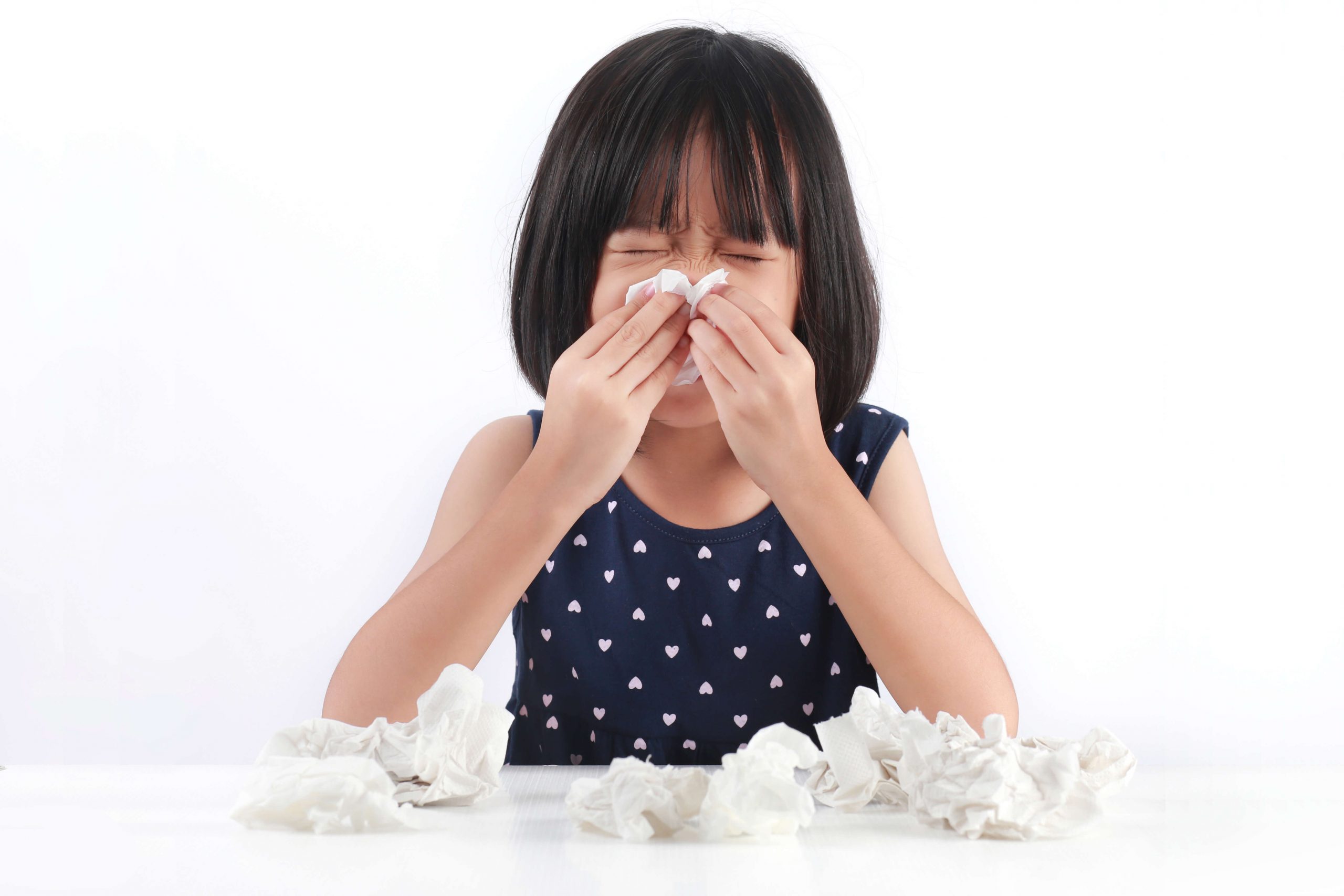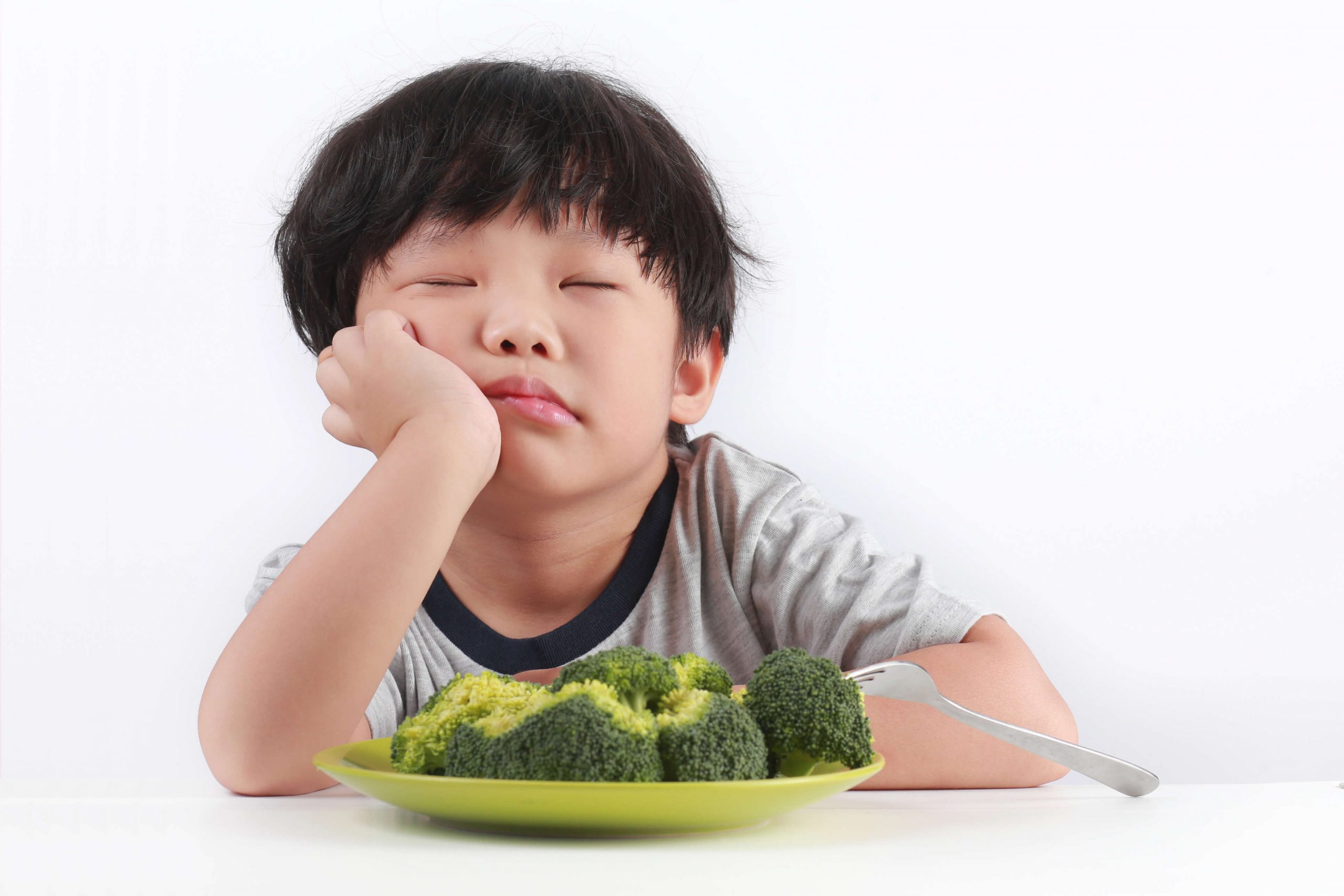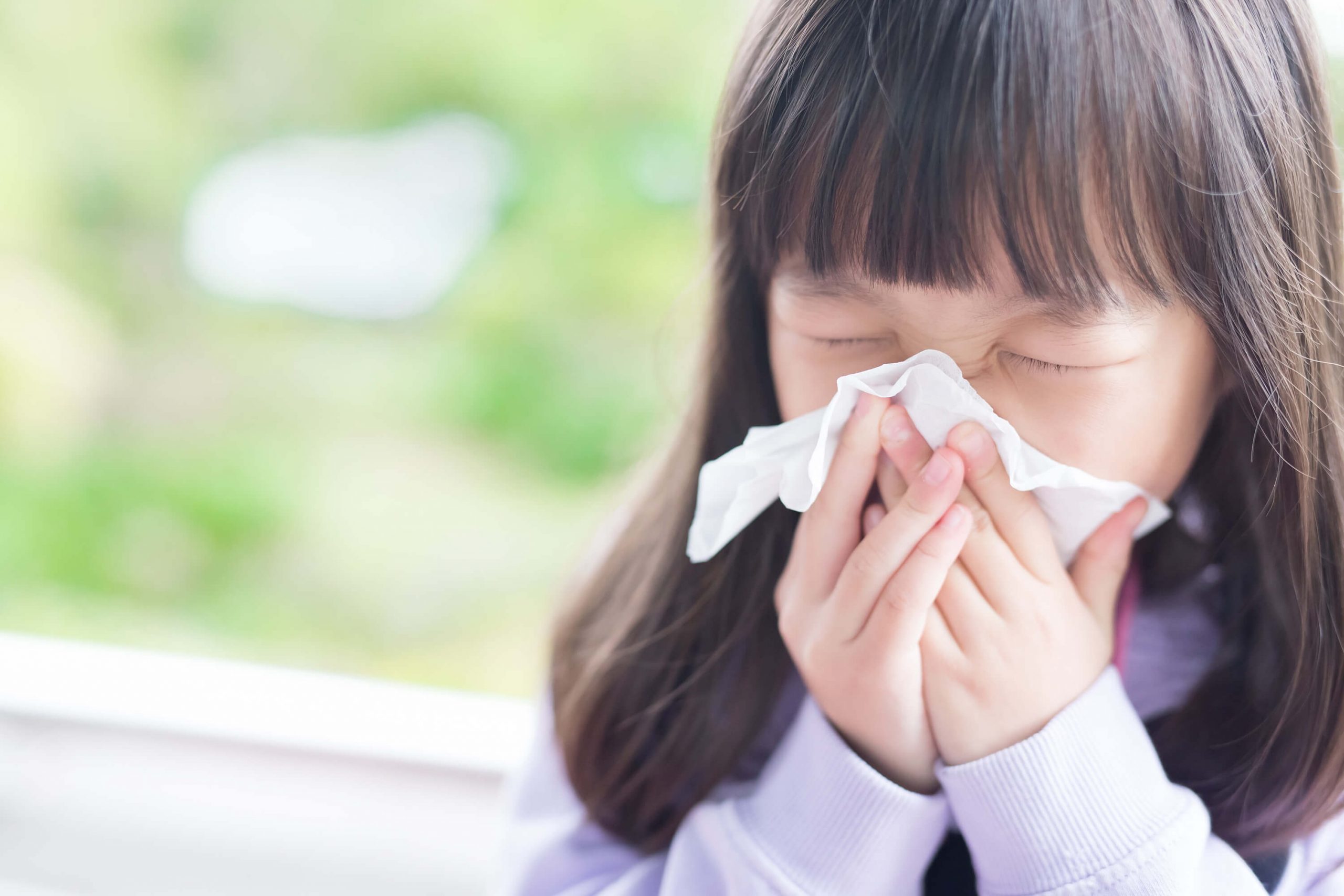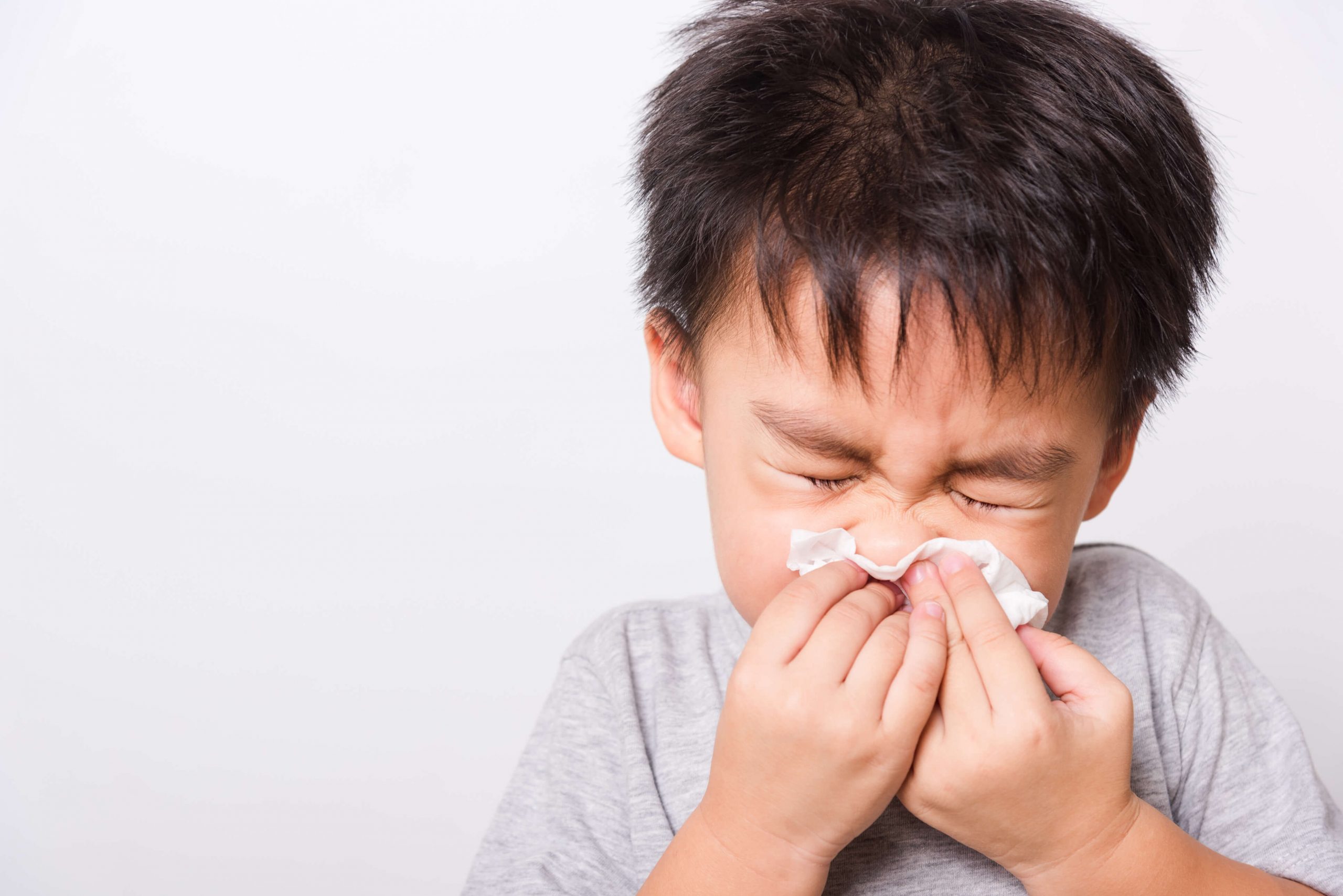Children & Parenting
Allergic Rhinitis In Children: A Quick Guide

Allergic rhinitis is a common childhood ailment caused by allergies. It is characterised by a runny and itchy nose, sneezing, postnasal drip and nasal congestion. In some children, coughing may be a prominent symptom. A child with allergies may also have allergic conjunctivitis which is itchy, watery and red eyes, and is prone to middle ear problems.
As the symptoms of rhinitis are very similar to that of the common cold, parents may think that their children are just down with a ‘bad’ cold that doesn’t go away. However, the symptoms of allergic rhinitis generally do not recover unless the ‘trigger’ is removed from the environment.
Some examples of these ‘triggers’ include allergens like house dust mites, haze, cigarette smoke and pollen. ‘Hay fever’ is a better known term for allergic rhinitis triggered specifically by pollen.
Causes Of Rhinitis In Children
Rhinitis in children can be triggered by the following:
- House dust mites
- Haze
- Cigarette smoke
- Mould
- Pollen
- Cockroach droppings
- Animal dander
Allergic rhinitis also ‘runs’ in families, so a family history of allergic rhinitis can put your child at a higher risk for the condition. If your child already has other allergic conditions such as eczema or asthma, he or she is also more likely to have allergic rhinitis.
It is generally less common for food allergies to ‘trigger’ rhinitis. However, if you suspect that certain foods are causing an allergic reaction in your child, see a doctor who can evaluate your child’s condition before you decide to remove the food from his or her diet. This is because some foods are essential for a child’s growth so seek medical advice before you stop your child from eating them.
Symptoms Of Rhinitis
The common symptoms of rhinitis in children are as follows:
- Runny nose
- Sneezing
- Coughing
- Itchy nose, eyes, throat
- Blocked nose
- Nosebleeds
- Ear infections
- Snoring
- Poor concentration/ attention span in the day school because of poor sleep
- Dry mouth due to mouth breathing
Coughing, nasal congestion, and difficulty breathing at night can affect sleep, and make it difficult for your child to focus at school during the day and to do well at sports/ physical activity.
Studies have shown that many children with asthma have concomitant allergic rhinitis, so it is important for parents to understand that these two conditions are related.
Latest Articles
How Are Abdominal Hernias Treated?
What to Expect from Colorectal Surgery
How to Treat Breast Inflammatory Conditions
Gynaecomastia: Understanding Male Breast Cancer
Diagnosis & Treatment
Your child’s doctor can diagnose your child based on a full medical history and physical examination. He or she may also find ‘dark circles’ and creases under your child’s eyes, or swollen glands inside your child’s nose (turbinates).
Allergy testing (by skin or blood tests) may be performed to check for the triggers that may be causing your child’s symptoms.
Treatment includes avoiding the allergens causing your child’s rhinitis, and treating the symptoms of the condition. Your child’s doctor will consider your child’s age, medical history, the severity of your child’s condition and your child’s ability to handle specific medications and procedures.
To treat the symptoms, your child’s doctor may prescribe the following:
- Antihistamines: Oral antihistamines can suppress the release of ‘histamine’, a chemical in the body involved in the inflammatory response that occurs with allergies. This would decrease the sneezing, itching or runny nose your child is having. Some antihistamines can cause drowsiness but there are newer non-sedating antihistamines that do not make your child drowsy. The non-sedating antihistamines are preferred for long term allergy control, and these include fexofenadine (Telfast), loratadine (Claritin) and cetirizine (Zyrtec). If your child is under 2 years old, please consult your child’s doctor before starting him/ her on these medications.
- Steroid Nasal Sprays: Steroid based nasal sprays may be recommended if your child’s rhinitis symptoms are moderate to severe. These sprays help with controlling the inflammation in your child’s nasal lining, and improve symptoms. Some parents may be reluctant to use these due to the presence of steroids, but the amount of steroids in these nasal sprays are generally small and safe for children. Of importance is the technique of how to administer it to your child, so do check with your child’s doctor before use.
- Nasal Decongestants: Topical decongestants applied to the nose in the form of nosedrops or sprays may help in relieving congestion in the nose, and are usually prescribed for short term usage.
- Leukotriene Receptor Antagonists: An example of medication in this group would be montelukast, which is. a non- steroid based oral medication used to treat allergic conditions like asthma and allergic rhinitis.
- Immunotherapy: This method involves introducing a tiny amount of allergen to your child’s body daily over a long period (eg. 3-5 years) so that your child builds up tolerance to the allergen over time.
Children generally do not outgrow allergic rhinitis, but as they grow older, the symptoms in some children may improve with time.
As house dust mites are one of the most common causes of allergic rhinitis locally, you can take some precautions at home:
- Change the pillow cases and bed sheets once every week and wash them in hot water above 60 degrees Celsius
- Consider the use of house dust mite covers for pillows and mattresses in your home
- Avoid having carpets or rugs in the room
- Avoid having heavy curtains in the room as these often collect dust and are harder to maintain
- Avoid having soft toys displayed on your child’s bed. Keep them away in closed cabinets or boxes
- Use vacuum cleaners with high-efficiency particulate filters that can retain microscopic allergen particles
- Avoid pets in the room
- Keep your child’s room clean and free from mould and dust as much as possible
Conclusion
Allergic rhinitis in children is common locally, and is characterised by frequent coughing, sneezing, itching and a blocked or runny nose that doesn’t get better over time. The condition can affect your child’s sleep and hence his or her daily life and performance at school.
If you suspect your child has rhinitis, take him or her to a doctor for a diagnosis. The best course of action is to try to identify the allergen causing your child’s rhinitis and keeping your child away from the allergen. Medications like oral antihistamines and nasal sprays may be prescribed by your child’s doctor depending on his/her age, symptoms and severity to help treat the condition.
Read this next ...
WHO WE ARE
About SOG Health Pte. Ltd.
Established in 2011, SOG Health Pte. Ltd. (“SOG”) is a leading healthcare service provider dedicated to delivering holistic health and wellness services to the modern family.
With a long and established track record in Singapore providing Obstetrics and Gynaecology (“O&G”) services such as pre-pregnancy counselling, delivery, pregnancy and post-delivery care, the Group has since further expanded its spectrum of healthcare services to include Paediatrics, Dermatology, and Cancer-related General Surgery (Colorectal, Breast & Thyroid).
The Group’s clinics, under its four operating segments of O&G, Paediatrics, Oncology and Dermatology, are strategically located throughout Singapore to provide easy access to its patients.
- Obstetrics
- Gynaecology
- GynaeOncology
- Breast, Thyroid & General Surgery
- Colorectal, Endoscopy & General Surgery
- Dermatology
- Paediatrics
Consult With A Specialist From SOG
Visit one of our specialists today to learn more about your health!
Recommended Paediatricians
Book An Appointment
Fill up this form and our clinic will get back to you shortly.
For general enquiries, please click here.




